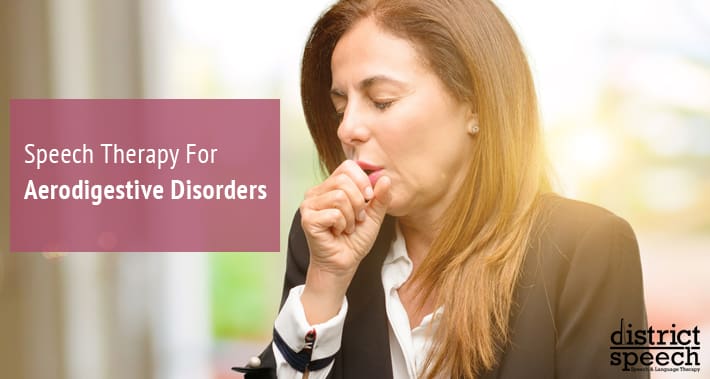
If you are struggling with an aerodigestive disorder, you may be struggling with issues breathing, swallowing, and speaking.
These disorders affect your upper digestive tract and respiratory tract.
If you’ve been diagnosed with an aerodigestive disorder, you may be noticing changes to your voice.
Your voice might become weak, or change in pitch.
While there are a myriad of symptoms involved in aerodigestive disorders, vocal ones can be especially distressing because they are noticeable to others around you, which may feel isolating.
If this struggle is something you relate to, speech therapy services can help.
Speech therapists are trained to help you strengthen the muscles that may be affected by these disorders.
Let’s take a closer look at how this disorder works, and how speech therapy can help.
What Is The Aerodigestive Tract?
The organs and tissues that make up your upper digestive track and respiratory tract are called the aerodigestive tract.
This includes your airway (pharynx and larynx), pulmonary tract (trachea, bronchi, and lungs), and upper digestive tract (esophagus).
Your aerodigestive tract is responsible for both breathing and swallowing.
The airway needs to be protected while you eat and drink while still allowing airflow.
The structure of the aerodigestive tract is different in infants and toddlers.
What Are Aerodigestive Disorders?
Conditions that may affect respiratory and swallowing functions are called aerodigestive disorders.
This can result in voice problems.
It can also cause you to have trouble swallowing while eating.
Surgery and intubation or interventions for aerodigestive disorders can also contribute to these issues.
Aerodigestive disorders can be acquired, developed, or congenital (genetic).
You can have more than one disorder, as they are not mutually exclusive.
Aerodigestive Disorders Of The Airway
Here are some (though not nearly all) of the common aerodigestive disorders of the airway:
- Chronic cough
- Epiglottitis
- Irritable larynx
- Fungal infections of the pharynx
- Laryngeal clefts, paralysis, stenosis, or webs
- Muscle tension dysphagia and dysphonia
- Breathing – swallowing incoordination
- Structural changes resulting from injury, radiation therapy, or intubation
Aerodigestive Disorders Of The Pulmonary Tract
Aerodigestive disorders of the pulmonary tract (trachea, bronchi, and lungs) include but are not limited to:
- Bronchomalacia
- Chronic lung disease
- Tracheoesophageal fistula
- Infectious diseases that affect pulmonary function
- Tracheal stenosis
- Neoplasms
- Structural or physiological changes
- Tracheal stenosis
- Tracheomalacia
Aerodigestive Disorders Of The Upper Digestive Tract
Aerodigestive disorders that affect the upper digestive tract can include some of the following:
- esophageal motility disorder, including spasm and achalasia
- gastroesophageal reflux
- esophageal structural disorders such as stricture, web, diverticulum, and ring
- inflammatory forms of esophagitis like eosinophilic, viral, and reflux
Symptoms Of Aerodigestive Disorders
Because of the different parts of your body that aerodigestive disorders can affect, signs and symptoms may vary greatly.
If you notice changes in how you’re swallowing or breathing, this could be a symptom.
If your desire to eat and drink has changed this could also be a sign of an aerodigestive disorder.
You may also experience an aversion or disinterest in food, avoidance of certain foods, or wanting to avoid eating in public spaces.
Maybe you’re coughing or choking after eating or swallowing has become difficult or painful.
Vocal symptoms include breathiness, pain while speaking, and vocal fatigue.
You may also notice changes to your voice’s pitch, weak volume, or a strained quality to your voice.
Paradoxical vocal fold movement (PVFM) involves symptoms that include difficulty inhaling, exhaling, or both.

What Causes Aerodigestive Disorders?
There are a variety of causes of aerodigestive disorders.
The categories of causes include congenital, structural or anatomical, functional, and other medical conditions.
Congenital causes might include atypical development.
A structural problem could result from an injury or a weakness or dysfunction of the upper esophagus.
Emotional stressors like fear and anxiety can be a functional symptom, as these emotions can increase muscle tension.
Exercise and environmental irritants are also functional issues you might encounter.
Chronic cough can be caused by asthma, esophageal disease, sinusitis and rhinitis, and postnasal drip.
Other medical conditions that can cause aerodigestive disorders include autonomic dysfunction, cardiovascular, pulmonary, or neurological diseases, and recovery from respiratory failure.
How Can Speech Therapy For Aerodigestive Disorders Help?
A speech therapist can be a vital asset in treating your aerodigestive disorder.
Vocal symptoms can be especially challenging to deal with.
You might experience pitch changes due to inflammation or notice that it takes increased effort to speak.
A speech therapist will work with you to create a plan that will address the issues that have come up due to your aerodigestive disorder.
They may suggest breathing exercises that can improve your vocal resonance.
Muscle exercises can be assigned to retrain and strengthen the muscles that support your aerodigestive tract.
Speech therapy can be individually tailored to your needs as you navigate what can be a complicated and stressful disorder.
Book Your Appointment With District Speech Today
If you’re thinking you could benefit from speech therapy for your aerodigestive disorder, there is help available.
You don’t have to face this struggle without guidance.
Book your appointment with District Speech today.
1300 I St NW, Suite 400 E,
Washington, DC 20005
- https://g.page/districtspeech
District Speech and Language Therapy specializes in speech therapy, physical therapy, and occupational therapy solutions, for both children and adults, in the Washington D.C and the Arlington Virginia areas.